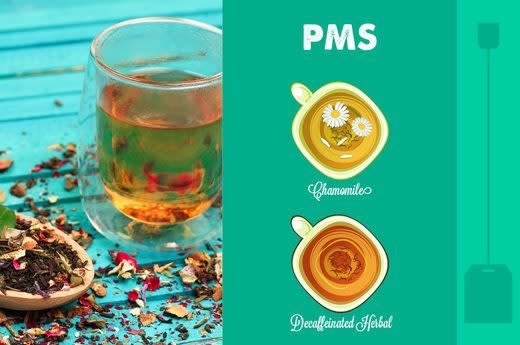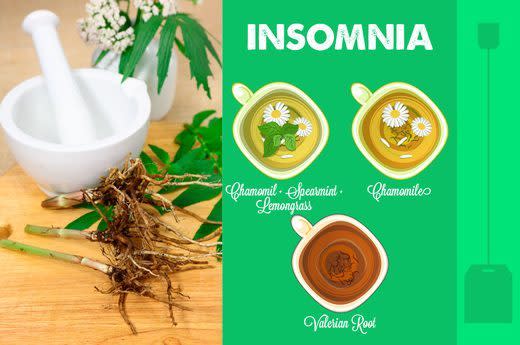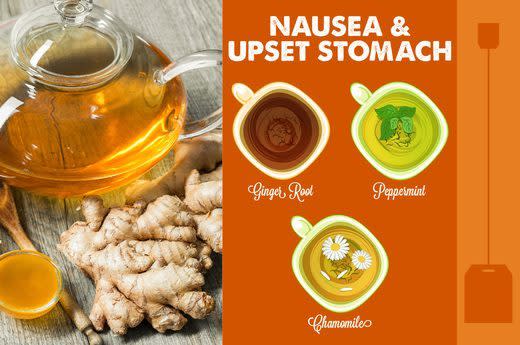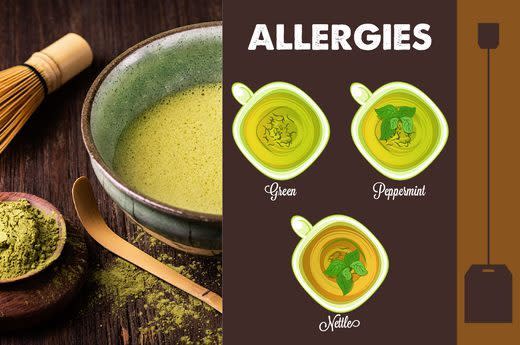Soothe These 5 Everyday Ailments With Tea

There’s no problem a cup of tea won’t solve. (Photos: Demand Studios)
The most popular beverage in the world, as well as one of the healthiest, tea has traveled the globe since it was first discovered in ancient China. For several thousand years, people have enjoyed tea because of its medicinal qualities and soothing taste. On any given day, more than half of the American population drinks tea. In fact, in 2014 Americans consumed more than 80 billion servings of tea, or more than 3.6 billion gallons, and that doesn’t even include herbal teas.
“True” teas – green, black, oolong and white – are all made from the same plant, a warm-weather evergreen named Camellia sinensis. Herbal teas are also available in abundance and can be made from any leaf, root, fruit or flower that comes from a plant. The varieties and options for teas seem endless, and they are bursting with health benefits. Here’s a look at 5 common ailments and the teas that might soothe them away.
1. Anxiety
If you’re feeling anxious, worried or stressed, a mug of chamomile tea might help take the edge off. The daisy-like flowering plant has been used for centuries to ease a variety of ailments. One study at the University of Pennsylvania found that those with a generalized anxiety disorder (GAD) who took a chamomile supplement for eight weeks had a significant decrease in anxiety symptoms compared with those taking a placebo. It’s also free of caffeine, which is important because caffeine can increase anxiety in some people.
Related: All-Natural Beauty Products You Can Find in the Kitchen
Also, green tea (particularly gyokuro and matcha) and black tea contain an amino acid (L-theanine) that is shown to create a calm yet alert state. One study published in the Journal of Functional Foods found that those prone to anxiety were calmer and more focused during a test if they took 200 milligrams of L-theanine beforehand. Supplements usually contain 200 milligrams of the amino acid – that’s equivalent to about six to 10 cups of tea. Another tip: Brewing teas longer will increase the amount of the calming amino acid they contain.

2. PMS
Irritability, weight gain, digestive problems, food cravings, sleep issues – and the list goes on. These can all be symptoms of PMS, or premenstrual syndrome, which can affect women for up to two weeks before they menstruate. Naturally decaffeinated herbal teas are the best choices during PMS because caffeine can increase levels of hormones that exacerbate the symptoms. One of the most popular herbs in the world, chamomile is a smart tea choice during that time of the month because it has been shown to relieve muscle cramps and reduce tension that can lead to anxiety and irritability.

3. Insomnia
Having trouble getting your zzz’s? There are some teas that can help. Appropriately named Sleepy Time tea, this is a type of herbal tea blend produced by Celestial Seasonings. The main herbs in Sleepy Time tea are chamomile, spearmint and lemongrass. Chamomile may be the most sleep-inducing component in the mix – it has long been used to reduce anxiety and aid with sleep. Valerian root tea is another tea to consider if you are having trouble sleeping.
Since the time of ancient Rome and Greece, the herb has been used as a medicinal remedy, including for insomnia. Valerian root contains natural compounds that act as a sedative. Drinking valerian root tea a couple of hours before bed can be a safe alternative to other types of sleep aids. However, talk to your doctor before taking valerian root because prolonged use can lead to dependency and interfere with certain prescription medications.

4. Nausea and Stomach Upset
Tummy upset? Drink some tea. Ginger, peppermint and chamomile are all herbal teas shown to help settle a queasy stomach. Researchers believe ginger contains chemicals that not only work in the intestines and stomach to reduce nausea, but also possibly in the brain and nervous system. Peppermint tea has long been used for an upset stomach, and several studies have shown that peppermint oil may be beneficial for those with irritable bowl syndrome (IBS).
Related: 9 Things Only Type A People Will Understand
Peppermint tea has also been shown to help alleviate gas and promote digestion (by increasing the flow of bile) as well as help unwind stomach cramps and ease nausea. Derived from daisy-like flowers, chamomile tea is also a popular remedy for treating upset stomach. Known in Germany as “capable of anything,” chamomile tea has been shown to reduce muscle spasms, help treat digestion and ease flatulence and heartburn.

5. Allergies
Itchy eyes, sneezing and congestion can all be symptoms of seasonal allergies. While some allergies are so severe they require attention from a doctor, milder cases can often be helped with at-home remedies. Peppermint tea, green tea and nettle tea may all help reduce allergic reactions. Peppermint contains menthol properties that can help break up mucus and clear it from your throat and nose. Green tea provides powerful antioxidants (called EGCG) that have been shown in lab tests to inhibit allergic reactions; however, the benefits are not noticeable for seasonal allergy sufferers.
For those suffering from seasonal allergies, stinging nettle tea may improve symptoms like sneezing, stuffy nose and itchy eyes because the tea has antihistamine properties that may help prevent allergy attacks from happening in the first place. As for what to avoid: Chamomile tea is actually not a good choice for people with ragweed allergies because it may increase the reactions.
The original article “10 Everyday Ailments Soothed by Tea“ appeared on LIVESTRONG.COM.
By Patricia Bannan, MS, RD
More from LIVESTRONG.COM:
11 Food-Safety Mistakes You Don’t Know You’re Making
How to Build the Perfect Green Drink
The 6 Most Common Bulletproof Coffee Mistakes
